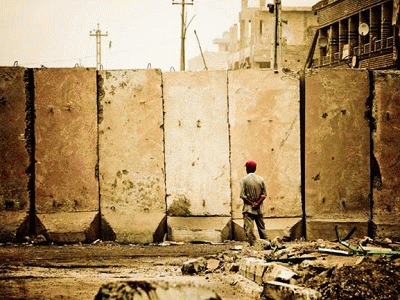Reprinted from Palestine Chronicle
Consider this comical scene described by Peter Van Buren, a former US diplomat, who was deployed to Iraq on a 12-month assignment in 2009-10:
Van Buren led two Department of State teams assigned with the abstract mission of the "reconstruction" of Iraq, which was destroyed in the US-led wars and sanctions. He describes the reconstruction of Iraq as such:
"In practice, that meant paying for schools that would never be completed, setting up pastry shops on streets without water or electricity, and conducting endless propaganda events on Washington-generated themes of the week ('small business,' 'women's empowerment,' 'democracy building')."
As for the comical scene: "We even organized awkward soccer matches, where American taxpayer money was used to coerce reluctant Sunni teams into facing off against hesitant Shiite ones in hopes that, somehow, the chaos created by the American invasion could be ameliorated on the playing field."
Of course, there is nothing funny about it when seen in context. The entire American nation-building experiment was in fact a political swindle engulfed by many horrifying episodes, starting with the dissolving of the country's army, entire official institutions and the construction of an alternative political class that was essentially sectarian.
Take the Iraqi Governing Council (IGC), which was founded in July 2003 as an example. The actual ruler of Iraq was the Coalition Provisional Authority (CPA), headed first by General Jay Garner, then by Paul Bremer, who, effectively was the governor of Iraq. The figureheads of the IGC were mostly a conglomerate of pro-US Iraqi individuals with a sinister sectarian past.
This is particularly important, for when Bremer began mutilating Iraqi society as dictated to him from Washington, the IGC was the first real sign of the American vision for Iraq with a sectarian identity. The council was made of 13 Shias, five Sunnis, five Kurds, a Turkmen and an Assyrian.
One would not dwell on the sectarian formation of the US-ruled Iraq if such vulgar sectarianism were embedded in the collective psyche of Iraqi society. But, perhaps surprisingly, this is not the case.
Fanar Haddad, author of Sectarianism in Iraq: Antagonistic Visions of Unity, like other perceptive historians, doesn't buy into the "ancient hatred" line between Sunnis and Shia. "The roots of sectarian conflict aren't that deep in Iraq," he said in a recent interview.
Between the establishment of the modern Iraqi state in 1921 and for over 80 years, "the default setting (In Iraq) was coexistence." Haddad argues that "Post-2003 Iraq ... identity politics have been the norm rather than an anomaly because they're part of the system by design."
That "design" was not put in place arbitrarily. The conventional wisdom was that the US army is better seen as a "liberator" than an invader, where the Shia community was supposedly being liberated from an oppressive Sunni minority. By doing so, the "liberated" Shia majority were armed and empowered to fight the "Sunni insurgency" throughout the country. The "Sunni" discourse, laden with such terminology as the "Sunni Triangle" and "Sunni insurgents" and such, was a defining component of the American media and government perception of the war. In fact, there was no insurgency per se, but an organic Iraqi resistance to the US-led invasion.
The design had in fact served its purposes, but not for long. Iraqis turned against one another, as US troops mostly watched the chaotic scene from behind the well-fortified Green Zone. When it turned out that the US public still found the price of occupation too costly to bear, the US redeployed out of Iraq, leaving behind a broken society. By then, there were no more Shia vs. Sunni awkward football matches, but rather an atrocious conflict that had claimed too many innocent lives to even be able to count.
True, the Americans didn't create Iraqi sectarianism. The latter always brewed beneath the surface. However, sectarianism and other manifestations of identity politics in Iraq were always overpowered by a dominant sense of Iraqi nationalism, which was violently destroyed and ripped apart by US firepower starting March 2003. But what the Americans truly founded in Iraq was Sunni militancy, a concept that has until recently been alien to the Middle East.
Being the majority among Muslim societies as a whole, Sunnis rarely identified as such. Generally, minorities tend to ascribe to various group memberships as a form of self-preservation. Majorities feel no such need. Al-Qaeda for example, seldom made such references to being a Sunni group, and its targeting of Shia and others was not part of its original mission. Even its violent references to other groups were made in specific political contexts: they referred to the "Crusaders" when they mentioned US military presence in the region, and to Jews, in reference to Israel. The group used terror to achieve what was essentially political objectives.
But even al-Qaeda identity began changing after the US invasion of Iraq. One could make the argument that the link between the original al-Qaeda and current group known as the Islamic State (IS) is Abu Musab al-Zarqawi. The Jordanian-born militant was the founder of al-Tawhid wa al-Jihad group, and didn't join al-Qaeda officially until 2004. A merger had then taken place, resulting in the creation of al-Qaeda in Iraq (AQI)
(Note: You can view every article as one long page if you sign up as an Advocate Member, or higher).





